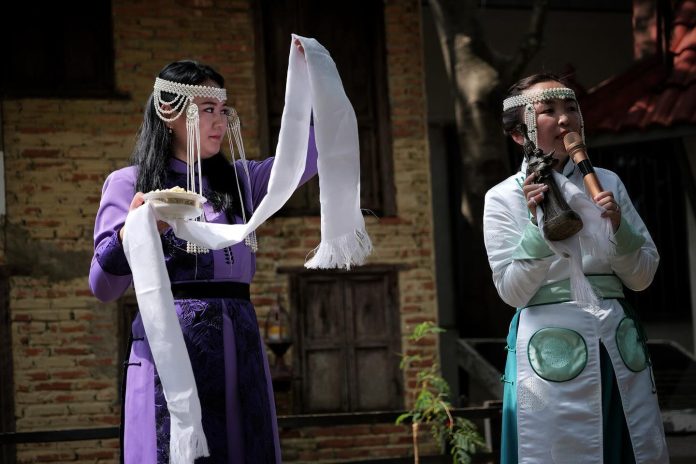Mongolian is spoken by 95 percent of the population. A variety of dialects of Oirat and Buryat are spoken across the country, and there are also some speakers of Mongolic Khamnigan.
In the west of the country, Kazakh and Tuvan, both Turkic languages, are also spoken. Mongolian Sign Language is the principal language of the deaf community.
Today, Mongolian is written using the Cyrillic alphabet in Mongolia, although in the past it was written using the Mongolian script.
An official reintroduction of the old script was planned for 1994 but has not taken place as older generations encountered practical difficulties.
Schools are reintroducing the traditional alphabet. In March 2020, the Mongolian government announced plans to use both Cyrillic and the traditional Mongolian script in official documents by 2025.
Mongolian shamanism has been widely practiced throughout the history of what is now Mongolia, with similar beliefs being common among the nomads of central Asia.
They gradually gave way to Tibetan Buddhism, but shamanism has left a mark on Mongolian religious culture, and it continues to be practiced.
The Kazakhs of western Mongolia, some Mongols, and other Turkic peoples in the country traditionally adhere to Islam.
In Mongolia, we have the stories of Gengis Khan, who was a conqueror of many nations. In contrast, we can recognize the existence of the Supreme Being or a Father of Creation.
These two elements belong to the dialogue of our spiritual world: The events of human history and the fact of a Supreme Spirit.
In ancient times, our ancestors knew the sky god Tengri, the personification of the universe. The purpose of life is to be in harmony with the universe.
Religion was banned in our country for many decades. Therefore, we are in search of the meaning of life.
When we confront stories of the Bible with our own ancient stories, we can find some similarities in spiritual values.
Therefore, catechists and missionaries in our country should know those stories very well.
For us, the land means what our ancestors left to us, what we defend, and the place of our freedom… Freedom land.
We have to protect our ancestral people’s land, because it is the natural place of our culture and traditions, our sovereignty. Mongolia is a place of extreme climates.
In the south we have steppes and in the north the Gobi desert. Global warming can affect our fragile environment, because it can increase the natural process of desertification, causing the destruction of fragile economies of the nomadic people.
For millennia, our people have lived in harmony with the land, developing our culture and traditions, but now the aboriginal identity of nomadic people is in danger of disappearing.
Many nomadic tribes are abandoning their territories and settling in the city or migrating abroad.
The city is also at the risk of overpopulation with all the conflicts and situations it brings such as contamination and insufficient basic services for the population.
We think that it is important to encourage young people to join in a clear way of development based on participation, integrating technologies, and working together in solutions for global warming that include the revision of our ancestral knowledge.
For us, in Mongolia, home is a comfortable place where we find love and we stay warm and in harmony.
Our nomadic life, living in the desert, makes us see the stories of the Bible with very similar situations.
It is easier to understand the parables of Jesus because He was also living in a desert, with people very similar to us.
Before the visit of Pope Francis to Mongolia (31 August to 4 September 2023), the authorities put a lot of conditions on the Catholic Church. But the visit of the Pope was very positive.
Our traditional spiritual leaders, medicine men, or elders engage in a variety of spiritual practices such as prayer, meditation, and rituals.
They use these practices to establish a connection with the divine and to seek guidance and wisdom.
They rely largely on their own initiative and psychic and occult powers of divination, healing, and direct access to the spirit world at their command.
The priests supplicate and conciliate supernatural forces superior to himself, guarding sacred traditions in his care, and acting as the master of sacrifice.
Inculturation is important for every religion because you have to master the language and know the culture to make it alive.
For our country, it is too difficult to translate from English or any other language into Mongolian.
The Catholic Church is only 32 years old in the country, so it is still very young. Therefore, there is much to do in the terrain of translations and it is necessary because people do not easily understand things like doctrines.
But elements like music and singing are popular. We appreciate it as an excellent means of communication.
In our culture, some elements of the Catholic Church such as celibacy are strange, as well as wedding ceremonies and the use of Christian symbols such as a cross on a tomb.
All those elements are objects of discussion not only among Catholics but also among non-Catholics.
Another problem we see is those Catholic youth who migrate to the city and stop to attend Catholic ceremonies, being attracted by a modern society, where religion seems not important.
Written by Indigenous youths from Mongolia during the 10-day extensive media production training for Asian Indigenous youth in Kep province, Cambodia in March 2024.









